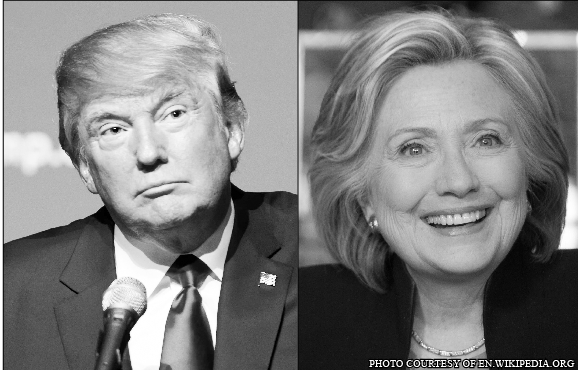
Characterized by viewers as entertaining yet frightening, the first 2016 Presidential debate was a showdown unlike any other, breaking the record of most-watched televised debate in U.S. history.
On Monday, Sept. 26, moderator Lester Holt sat down to conduct the highly anticipated verbal clash between Democratic nominee Hillary Clinton and Republican nominee Donald Trump. Topics addressed fell under the umbrella of the country’s direction and prosperity, gun control, racial profiling and economic solutions.
Multiple media giants including CNN and The New Yorker have decisively dubbed Clinton as coming out on top victoriously. Contrastly, Trump’s usual fiery bullying tactics were received by many as frantic and defeatist.
While Clinton rides on a high of post-debate confidence, many of her softer, less enthusiastic supporters remain delicate in terms of loyalty to her vote. Nonetheless, Clinton’s firm stance in the debate in avoiding Trump’s landmines of insults have improved perceptions of her potential as president.
“As someone who doesn’t want to see Trump elected, I was relieved,” said SUNY New Paltz Political Science and International Relations Chair and Professor Jeffrey Miller. “Historically, I don’t think debates move the needle that much, but in this case Clinton is going to get a bump out of this, which I didn’t expect.”
Miller’s debate expectations were for Clinton to hold her own and Trump to contain himself. Although Trump did appear placid during opening statements, he very quickly lost the facade and returned to his usual demeanor.
“He just looked wild,” Miller said. “Even just kind of silly things are important on television. While Clinton is cool and calm, he’s making these gestures all over the place which is characteristic of him, but when you are on a split screen and you see both of them, it’s a poor image for him.”
Although humorous to watch, Miller said Trump’s ridiculous dispositions and viewpoints are no longer laughable because he is at the potential cusp of becoming president. Miller describes Trump’s possibility of election as an issue beyond partisan agreements because he would so severely test the basic constraints and mechanisms that function in a democracy.
Miller expressed his concern of whether or not Trump can be constrained and contained. Despite the loss of support from countervailing powers in House, Senate and military, the question arises: how long will they reject Trump if he is elected?
“It is true that the leadership of the House and Senate are not truly on board with Trump to say the least,” Miller said. “But if he is elected and they get a president in office, it becomes in their interest to be in his corner and side with him.”
Miller questions if the pushback Trump is receiving from those in his own party will last if he becomes President.
What Trump can’t do with a stroke of a pen, he can do legislatively. Miller said in the worst case scenario, the House and Senate remain Republican and Trump appoints a few Justices, gaining the majority of the court. Here, he could do some serious damage to the basic fundamental institutions that uphold this democracy.
Even with widespread Trump fear and Clinton being considered clearly the “lesser of two evils,” this election remains unpredictable in terms of how voters will be swayed in the next few weeks.
Harvard University Professor and Director of the Institute for Quantitative Social Science at Harvard Gary King said that political analysts have historically been able to make predictions on the outcomes of elections based on past trends and viewpoints. King has taken part presidential forecasting in past elections.
“Forecasting is something we political scientists do very well, it’s actually not hard,” King said. “People are not flighty, they tend to vote their interests.”
King said that this year the dividing line between parties has shifted, making it more complicated for analysts to make predictions indicative of past trends.
“It may be that Trump pulls all the traditional Republicans’ support, and Clinton pulls all the traditional Democratic support,” said King. “But it doesn’t look like that’s going to be the case, and we don’t know. This race is predictably unpredictable.”
For fourth-year political science major Peter Enia, also president of the Political Science Club, Clinton was the the clear winner of the debate. Students like Enia remain fascinated on how Trump responded toward his questions.
“When it came to being questioned about racial inequality issues, Trump replied by saying he has ‘nothing to say’ about the issue,” Enia said. “This is only hurting his relationship with minority communities – something he desperately needs.”
Enia said that although he recognizes both candidates may be considered hawks, Trump’s view on global affairs is a clear reflection of core neo-conservatism. According to Enia, if Trump does end up becomming President, the country would have to hope other nations won’t verbally insult , if they do Trump will “blow them out of the water,” as he said he would have done to those Iranian vessels.
Shocking slip-ups by Trump including his casual admission of not paying taxes being “the smart thing to do,” have sent supporters scrambling for some kind of justification to what many have called his idiocy.
This can only be the tip of the iceberg. Be sure to tune into the next debate on Oct. 9 for further disappointment and excitement.
